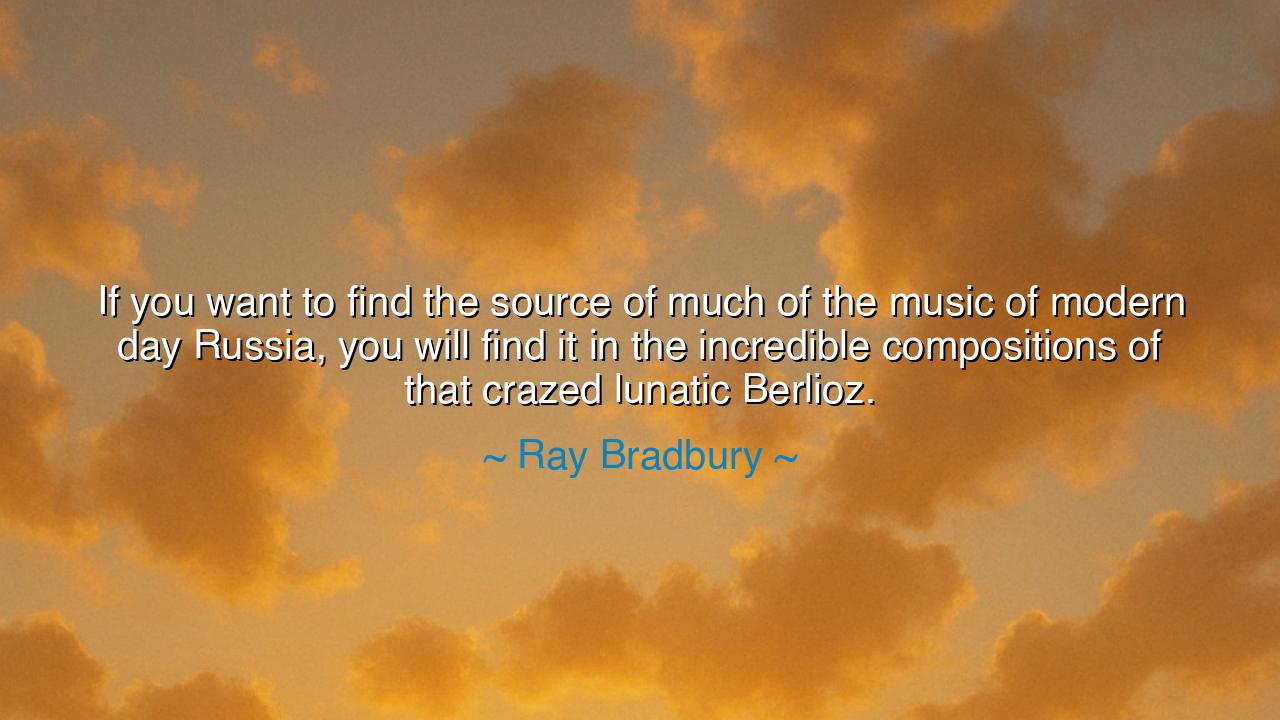
If you want to find the source of much of the music of modern
If you want to find the source of much of the music of modern day Russia, you will find it in the incredible compositions of that crazed lunatic Berlioz.






The words of Ray Bradbury—“If you want to find the source of much of the music of modern day Russia, you will find it in the incredible compositions of that crazed lunatic Berlioz.”—are spoken with the fire of one who saw connections where others saw only fragments. In this daring phrase, Bradbury reminds us that genius often appears as madness, and that what seems wild and chaotic in one age becomes the foundation of greatness in another. He calls Berlioz a “lunatic” not to insult, but to honor the untamed spirit that refused to conform, that shattered convention and in so doing gave birth to new possibilities.
Hector Berlioz, the French Romantic composer, was indeed seen as reckless by many of his peers. His symphonies were vast, overwhelming, filled with passion, chaos, and thunder. In works like the Symphonie Fantastique, he dared to pour his soul onto the page in ways that horrified the guardians of tradition but thrilled the young, the daring, the restless. His music was not polite—it was wild, imaginative, full of storms and visions. In this sense, Bradbury rightly saw him as the ancestor of Russian giants like Tchaikovsky, Mussorgsky, and Rachmaninoff, whose sweeping compositions carried the same emotional fire.
The Russian Romantics drank deeply from this spring. Tchaikovsky’s soaring melodies, whether in his ballets or symphonies, echoed Berlioz’s fearless emotionalism. Mussorgsky, in works like Pictures at an Exhibition, carried forward Berlioz’s daring to defy conventional harmony and embrace raw, national character. Even Rachmaninoff, with his towering piano concertos, bore the influence of Berlioz’s willingness to flood the senses with passion. The source of Russian grandeur in music, Bradbury claims, lies in the madness and brilliance of this one French visionary.
The ancients would have understood such lineage. They often spoke of muses and rivers of inspiration, flowing from one generation to another. Just as Homer gave rise to Virgil, and Virgil inspired Dante, so too does music carry within it a genealogy of spirit. Berlioz, though mocked as a lunatic in his own time, became the seed of fire for an entire nation’s art. His wildness gave Russia permission to create boldly, to craft compositions that were not timid imitations of Europe but powerful expressions of their own soul.
The meaning of Bradbury’s words is deeper still. He suggests that true creativity often looks insane to the ordinary eye. The prophet is dismissed as mad, the artist as a fool, the inventor as a dreamer. Yet it is in their “lunacy” that new worlds are born. Berlioz’s visions were too vast for the narrow halls of his critics, but the future embraced him, proving that sometimes the lunatic is simply one who sees farther than the rest.
The lesson for us is clear: do not fear being misunderstood. Do not fear the name of “madman” if your work springs from the deepest fire of your spirit. History shows us that the world’s sources of greatness often come from those who dared to stand apart, who broke the rules, who seemed to others like fools. What matters is not whether you are approved in your time, but whether your voice adds to the eternal symphony of human expression.
Practically, this means embracing boldness in your own craft—whether in art, science, teaching, or daily life. Take risks in what you create. Refuse to bow to small minds that demand conformity. Look to the Berlioz within yourself—the part that dares to be called “lunatic” because it refuses to betray its vision. If you do this, you may find that your work, too, becomes a source for others, long after your own time has passed.
Thus, let Bradbury’s words endure as both homage and challenge: the “lunacy” of Berlioz became the fountain of Russian music, proving that true genius often wears the mask of madness. So let us honor those who dare, and let us dare ourselves, for only through such courage do we give the world the melodies of tomorrow.






AAdministratorAdministrator
Welcome, honored guests. Please leave a comment, we will respond soon